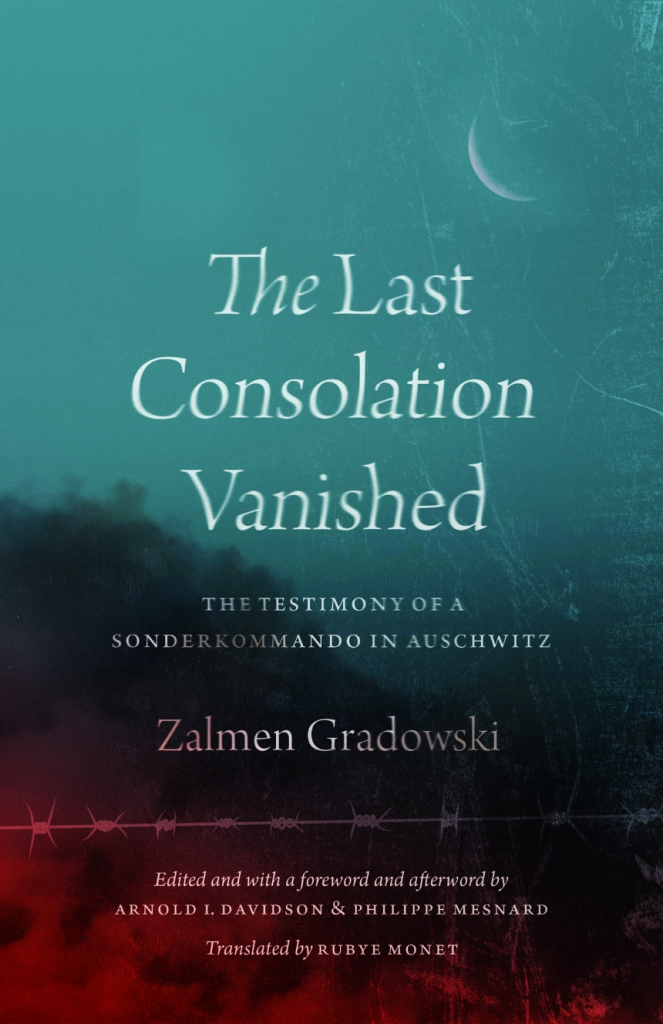Read an Excerpt from “The Last Consolation Vanished” by Zalmen Gradowski
The Last Consolation Vanished is a unique and haunting first-person Holocaust account by Zalmen Gradowski, a Sonderkommando prisoner killed in Auschwitz. His extraordinary account, accompanied by a foreword and afterword by Philippe Mesnard and Arnold I. Davidson, is a voice speaking to us from the past on behalf of millions who were silenced. Here, we share a moving excerpt from the book, entitled “The Song from the Grave.”
The Song from the Grave
In the large bunker stand thousands of victims, waiting for death. All at once, spontaneously, a song rings out. Once again the clique of superior officers stand transfixed. They cannot understand, they cannot grasp, how is it possible, that there in that bunker, in the heart of the grave, on the threshold of extinction, in the last moments of life, that people— instead of moaning, instead of weeping over their young lives about to be snuffed out— can raise their voices in song. Perhaps the Führer is right after all, that they are devils, for how can a mere human be so carefree, brave, and calm in the face of death.
The notes, the melody that now rises from that place is well known to all. Especially to them, the bandits, these sounds are like knives, like spears slashing into their hearts. What this mass of dead are singing now is the famous, the everywhere familiar, “Internationale.”

The Internationale, the anthem of the great Russian people— what they are singing now is the song of the powerful and victorious army.
The song tells them, reminds them, of the victories on the fronts won not by themselves, but by the others, by the Red Army. Against their will they find themselves carried away by the melody. Like a furious wave, the song sobers their muddled brains, clears their minds of their superstitious fanaticism and reminds them of all that is happening here.
The song forces them to leaf through the pages of a not-so-distant past and see the tragic and horrible reality. It reminds them that at the start of the war, the Führer- god explained and assured with his “ego” that in six weeks, all of Russia would lie under their boot, and in Moscow the black swastika would be flying over Red Square. And they believed that the end would be as certain as the beginning.
And what happened, what suddenly came to pass?
The victorious European armies that had so quickly enslaved powerful peoples, armed with the greatest technical means and military skills, armies led by seasoned strategists, imbued with the profound belief in the almighty victory, proud of their ancient dream of Germany, “Deutschland Über Alles”— now lie broken, running in full retreat. From the highest peaks they fall into the deepest abyss. And all the earth is soiled by their blood and flesh. Where is their strength? Where their art, technique, and strategy? How could they defeat all the others, but not these, not the Russians, a backward Asian people? Was it the force of internationalism that inspired them with supernatural strength, that forged their muscles into steel and turned their will into a storm that can destroy the world.
The melody of the song does not let them rest, it troubles them, shatters the certainty they felt up to now. Through the notes they hear the sounds of the marching armies who now with pride and strength stamp on the graves of their brothers over there. Through the notes they hear the shooting of the armies, the explosion of the dropping bombs. The melody grows stronger, the notes reach higher and higher. All are now carried away by the song which, like a stormy wave, breaks out of this place to pour out over the entire world, and in its might to wash away everything in its path.
Now they feel, now they perceive, this officer clique, representatives of the great strong power, how small, how worthless, how futile they are. It seems to them that the musical sounds are living beings that represent the two battling armies— one side winning with strength and greatness and the other, the one they represent here, standing numb and speechless, shivering with fear and dread.
The sounds come ever nearer to them, they feel them reaching, pushing into every corner, and wherever the sounds reach, the ground trembles beneath their feet. Soon there will be no place for them. And the ground, the only thing that was certain up to now, will also soon be drowned by the wave. Ah! The sounds, the melody, they speak of victory, they tell of a magnificent future. Already they see before their eyes, the victorious Red Armies running drunk with triumph through the streets of the Reich, cutting, trampling, burning, destroying everything that exists. Black thoughts run through their minds. Is that not the message of the song, that the vengeance that the Jewish woman here just now announced will become reality? Will they not soon have to pay for the singers of the song whose lives they are about to take? Who knows . . .
Zalmen Gradowski (1910–44) was a Jewish-Polish prisoner in Auschwitz-Birkenau and a member of the Sonderkommando who was murdered in Auschwitz.
The Last Consolation Vanished is available now from our website or your favorite bookseller.